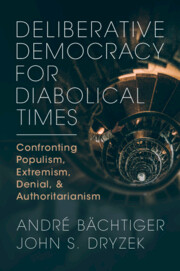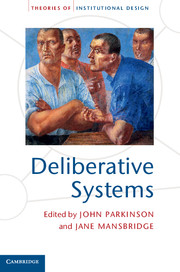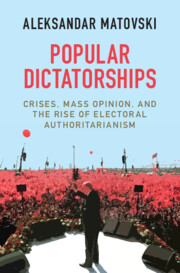Deliberative Democracy for Diabolical Times
Democracy today faces deep and complex challenges, especially when it comes to political communication and the quality of public discourse. Dishonest and manipulative communication amplified by unscrupulous politicians and media pervades these diabolical times, enabling right-wing populism, extremism, truth denial, and authoritarianism to flourish. To tackle these issues, we need to encourage meaningful deliberative communication – creating spaces for reflective and constructive dialogue, repairing unhealthy public spheres while preserving healthier ones, and building discursive bridges across deep divides. Citizens who see through elite manipulations should be at the core of this response, especially if bad elite behavior is to be effectively constrained. Democratic activists and leaders, diverse interpersonal networks, resilient public spheres, deliberative innovations and clever communication strategies all have vital roles to play in both defending and renewing democracy. Healthy discursive infrastructures can make democracies work again.
- Written by two noted scholars of democratic theory and practice who have both played a significant part in the exploding popularity of deliberative democracy as an approach to the theory and practice of democracy
- Establishes the relevance and strength of a deliberative response to democracy's many contemporary challenges and diabolical troubles, making sense of how widely-recognized challenges to democracy can be countered effectively
- Sets out clear prescriptions on how democracy can be communicatively renewed at a time when democracy in the world at large is under threat and in retreat
Reviews & endorsements
‘Two of our leading deliberative democrats ask what deliberative democracy can do to halt democratic erosion. Confronting the hard realities of democrat decline, Bächtiger and Dryzek sketch out how citizen centered communicative practices can help turn back the tide of that decline. Realistic and solution centered, this is a much-needed update to the deliberative democracy paradigm.’ Simone Chambers, Professor and Chair of Political Science, University of California Irvine
‘In these diabolical times many have wondered if more democracy is the answer to the numerous crises we face. Making the case for deliberative democracy, Bächtiger and Dryzek offer a clear and credible answer to this pressing question. This book is highly recommended for scholars and students of democratic governance.’ Frank Fischer, Research Scholar, Humboldt University, Berlin
‘Democracy is under pressure: democratic backsliding and deconsolidation; increasing levels of inequality; the emergence of populism and polarisation around the globe - too much noise and aggression and too little listening or reflection. It is into this hot arena that André Bächtiger and John S. Dryzek inject some urgently needed cool thinking. Deliberative Democracy for Diabolical Times is a sophisticated piece of solution-orientated political science.’ Matthew Flinders, Professor of Politics, University of Sheffield, and Vice President of the Political Studies Association of the United Kingdom
‘Despite taking the challenges to deliberative democracy seriously, this is an optimistic book. It argues that democratic activists and journalists can improve deliberation without enacting significant institutional reforms, and further, that people are more capable of deliberation than critics of democracy assert … Highly recommended.’ P. R. Babbitt, CHOICE
Product details
April 2024Paperback
9781009261876
264 pages
228 × 150 × 14 mm
0.38kg
Available
Table of Contents
- 1. An introduction for diabolical times
- 2. Deliberation for realists and skeptics
- 3. Democracy in a diabolical soundscape
- 4. How to deliberate with (and against) populists
- 5. How to deliberate with (and against) extremists
- 6. How to deliberate with (and against) deniers
- 7. How to deliberate with (and against) authoritarians
- 8. How to deliberate with everybody
- 9. How to renew a deliberative democracy
- Conclusion
- References.







